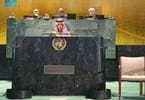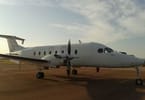Airline emissions should be capped at 2005 levels in 2050 to help ensure the success of global efforts to reduce greenhouse gases, said the U.K. Climate Change Committee, which advises Britain’s government.
Emissions from all airlines ranging from UAL Corp.’s United Airlines to Air Zimbabwe Ltd. “ideally” should be limited though initially flights between developing nations may be exempt, committee chairman Adair Turner said today to guide the U.K.’s approach in international climate negotiations.
Emissions from planes aren’t limited by a global treaty and companies including British Airways Plc and Air France-KLM Group have proposed an emissions trading system for all carriers. United Nations climate talks in Copenhagen in December should agree on measures that include aviation, the committee said.
“It is vital that an agreement capping global aviation emissions is part of a Copenhagen deal,” the committee’s chief executive, David Kennedy, said in an e-mail. “We are calling for a cap that would not require people to fly less than today but would constrain aviation emissions growth going forward.”
The United Nations estimates airlines, which aren’t subject to emissions limits under the Kyoto Protocol treaty, account for about 3 percent of greenhouse gases. Because of the growth in air travel, the environmental group Greenpeace estimates greenhouse gases from planes will double between now and 2050, emphasizing the need to rein them in.
The committee is an independent body that advises the U.K. government on how to cut the nation’s emissions and ministers have followed its advice in the past, including by raising national emissions reduction targets. Turner’s remarks were made in a letter to Secretary of State for Energy and Climate Change Ed Miliband and Transport Secretary Andrew Adonis.
Carbon Permits
Governments have been wary of imposing limits on domestic carriers that fly abroad for fear of hampering competitiveness. The UN Framework Convention on Climate Change, which is overseeing the Copenhagen talks, has deferred the task of reaching an agreement on airline emissions to the Montreal-based International Civil Aviation Organization.
Turner said either airlines should be included in a global sectoral agreement or emissions from international flights should be covered by domestic reduction targets. Carriers should be required to buy at auction permits to pollute known as carbon allowances and revenue from that could be used to help poorer nations adapt to the effects of climate change, he also said.
“Binge Flying”
In April, BA and Air France-KLM joined with Grupo Ferrovial SA’s BAA Ltd. U.K. airport unit and other airlines in calling for a worldwide emissions limit for all carriers and an emissions trading system to allow them to trade carbon permits. Executive Secretary Yvo de Boer of the UN climate change panel said at the time that “not a lot of progress has been made” on including aircraft emissions in a global deal.
The Group of Eight in July agreed for the first time to cut emissions by 80 percent by 2050 as part of an effort to cut total global greenhouse gas output in half by then.
Countries should aim to limit airline emissions in 2020 to 95 percent of 2005 levels and to no more than 2005 levels in 2050, Turner wrote.
The International Air Transport Association in Geneva, which represents about 230 airlines covering 92 percent of the world’s scheduled air traffic, said it aims to cut emissions by even more by mid-century.
“IATA has an aspirational goal of a 50 percent reduction by 2050 compared with 2005 and we’re seeking stabilization or carbon neutral growth by 2020,” said Tony Concil, a spokesman.
Tehnologia avansată
Turner’s proposed goals would help the U.K. meet its target of an 80 percent reduction in total emissions by mid-century so long as the nation reduces greenhouse gases by 90 percent from all other sectors including energy and manufacturing, he said.
“Aviation emissions are expanding rapidly and are set to double between now and 2050 according to the Government’s own policy,” Greenpeace campaigner Vicky Wyatt said. “The Committee’s findings show that carbon emissions from the British economy will have to be squeezed till the pips squeak in order to accommodate the binge-flying culture.”
Methods for reducing aircraft emissions include towing them onto runways before switching engines on, using biofuels and refining air traffic control so planes spend less time circling before landing.
EasyJet Plc Chief Executive Officer Andy Harrison said the European Union should set emissions standards for planes, as it does for cars, and that the U.K. should impose an emissions tax on flights instead of its current charge per passenger.
“We need to have measures which encourage airlines to fly modern, fuel-efficient aircraft and pressure manufacturers to bring forward the development of the next generation of aircraft,” Harrison said today in an e-mailed statement.
“Technology is the key to cutting aviation emissions,” he said. “The next generation of aircraft, which are under development, will reduce CO2 emissions by up to 50 percent.”
CE ESTE DE LUAT DIN ACEST ARTICOL:
- Executive Secretary Yvo de Boer of the UN climate change panel said at the time that “not a lot of progress has been made” on including aircraft emissions in a global deal.
- The Group of Eight in July agreed for the first time to cut emissions by 80 percent by 2050 as part of an effort to cut total global greenhouse gas output in half by then.
- The UN Framework Convention on Climate Change, which is overseeing the Copenhagen talks, has deferred the task of reaching an agreement on airline emissions to the Montreal-based International Civil Aviation Organization.






















